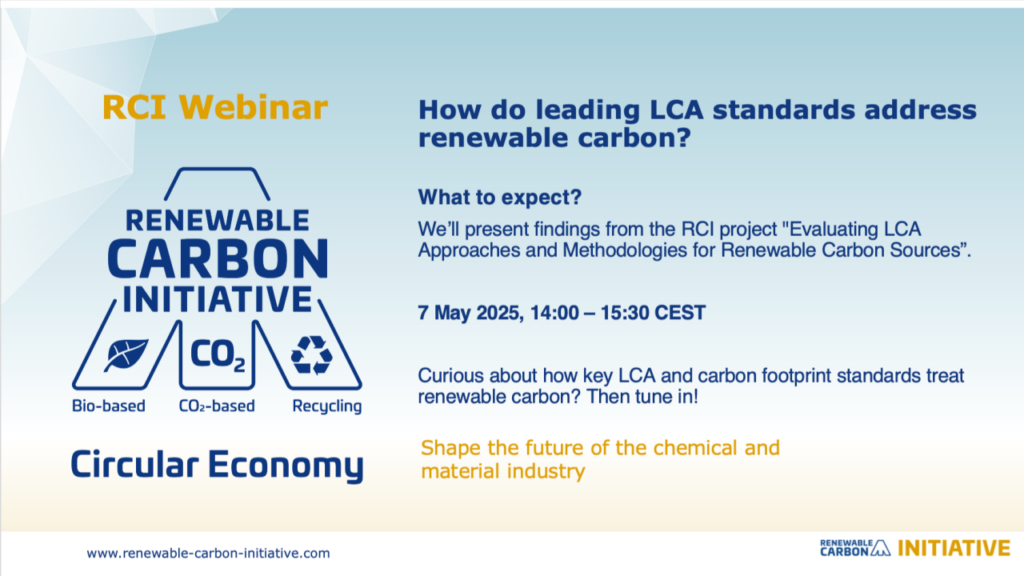News
16.04.2025
How to Defossilise the Chemical Industry: RCI’s new policy proposals for a Renewable Carbon Future
New report presents policy proposals to facilitate the transition from fossil carbon to renewable carbon from biomass, CO2 and recycling in Europe
The European chemical industry, a cornerstone of manufacturing with significant economic impact and a key enabler ... Read more12.03.2025
How Leading LCA Standards Address Renewable Carbon: An RCI Study
New study by the Renewable Carbon Initiative (RCI) analyses key Life Cycle Assessment and Carbon Footprint Standards and their implications for Renewable Carbon-based Products
The Renewable Carbon Initiative (RCI) has released a comprehensive study analysing th... Read more17.02.2025
Study Confirms Biomass Can Meet 20% of Carbon Demand in Chemicals Sector by 2050 without compromising food and feed supply
New study by Renewable Carbon Initiative and Biobased Industries Consortium reveals potential for significant defossilisation of the chemical industry using biomass.
A new study commissioned by the Renewable Carbon Initiative (RCI) and the Biobased Industries C... Read more21.01.2025
Biomass Demand for Transport Fuels, Aviation and Shipping up to 2050 and Implications for Biomass Supply to the Chemical Sector
Current transport regulations provide a unique long-term horizon for sustainable aviation and shipping fuel through the defined quotas – what does this mean for the chemical sector?
Following the Green Deal, the EU is leading the way in transforming its trans... Read more19.11.2024
Renewable Carbon Feedstocks: Building a Net-Zero Chemical Industry in 2050
A comprehensive analysis of 24 scenarios across 15 reports identifies biomass, CCU and recycling as the cornerstone of the chemical industry’s feedstock in 2050 Hürth, 19. November 2024: Experts from nova-Institute, on behalf of the Renewable Carbon Initiative (RCI), prepared a groundbreaking ... Read more01.07.2024
Science Based Targets Initiative (SBTi) extends scope to alternative carbon feedstocks
For the first time, SBTi’s latest draft consultation includes requirements for companies to set alternative feedstock targets for CCU, bio-based and chemical recycling – in line with RCI’s renewable carbon concept
The Science Based Targets Initiative (SBT... Read more22.05.2024
Chemical and Physical Recycling are Essential for the Realisation of the Green Deal and the Circular Economy
The Renewable Carbon Initiative has published a position paper outlining the importance of chemical and physical recycling and what is needed to realise its huge potential.
Chemical and physical recycling play essential roles in realising the objectives of the ... Read more10.04.2024
How to Enable the Transition From Fossil to Renewable Carbon in the Chemical and Material Sector
In a comprehensive member survey, the Renewable Carbon Initiative (RCI) collected ideas and opinions on what is needed to enable the transition from fossil to renewable carbon in Europe. The feedback paints a clear picture and is a call to action.
The Europea... Read more23.02.2024
Products made from crude oil have a significantly higher CO2 footprint than previously assumed
New data sets have substantial implications for the comparison of renewable carbon-based and fossil crude oil-based plastics
For years, the life cycle assessment community has been discussing how to make a fair comparison between products made from crude oil an... Read more10.01.2024
Non-level playing field for renewable materials vs. fossil in Life Cycles Assessments
Critical aspects of the JRC Plastics LCA methodology and its policy implications In the race towards the European Commission's net-zero targets, the shift from fossil-based to renewable materials is a critical journey for environmental sustainability. Available renewable carbon sources in this tran... Read more27.11.2023
Renewable Carbon-based Materials Show Significant Lower CO2 Footprint Than Fossil Counterparts
The Renewable Carbon Initiative (RCI) published their latest report “Case Studies Based on Peer-reviewed Life Cycle Assessments – Carbon Footprints of Different Renewable Carbon-based Chemicals and Materials”. The brochure-style report was put together by sustainability experts from nova-I... Read more
14.11.2023
What does carbon management really mean and involve?
New thinking and terminology is needed to meet climate goals and secure sustainable carbon supply
The focus of climate policy has been, and to a large extent still is, the decarbonisation of the energy sector, where significant progress has been made in the use of alternative energy source... Read more06.11.2023
Renewable Carbon Initiative Highlights Successful Annual General Meeting and Key Publication Update
The Renewable Carbon Initiative (RCI), a global network comprising more than 60 prominent companies from the chemical and materials sectors, convened for its annual General Meeting in Cologne from September 25th to 26th. This two-day event brought together over 50 representatives from various me... Read more
13.07.2023
No Sustainable Future Without Carbon Capture and Utilisation (CCU) – Why We Need Much More Political Recognition and Support for CCU
CCU enables the substitution of fossil carbon in sectors where carbon is necessary, supports the full defossilisation of the chemical and derived material industries, creates a circular economy, reduces the emission gap, promotes sustainable carbon cycles, fosters in... Read more
14.06.2023
The Use of Food and Feed Crops for Bio-based Materials and the Related Effects on Food Security – Promoting Evidence-based Debates and Recognising Potential Benefits
Renewable Carbon Initiative Publishes New Insights into a Hotly Debated Topic and Urges for Careful and Evidence-based Debates
In 2023, the world faces a global hunger crisis. According to the World Food Programme “a record 349 million people across 79 countr... Read more15.05.2023
Bio-based content, compostable plastics, and chemical recycling – many opportunities for more innovation and sustainability in the new Packaging and Packaging Waste Regulation (PPWR)
The Renewable Carbon Initiative’s position paper highlights chances for the EU to lead the way to a sustainable packaging industry and to promote innovation
In November 2022, the Commission adopted the Proposal for a Regulation of the European Parliament an... Read more15.03.2023
RCI Carbon Flows Report: Compilation of supply and demand of fossil and renewable carbon on a global and European level
The new report provides a comprehensive understanding of today's carbon flows and what it means to replace fossil carbon with renewable carbon in the materials and chemicals sectors
In the last five years, the mindset around carbon has changed fundamentally. Of... Read more23.11.2022
Industry calls for action on Sustainable Carbon Cycles
The Renewable Carbon Initiative strongly welcomes the European Commission’s Communication on Sustainable Carbon Cycles and calls for implementation of important measures Disclaimer: RCI members are a diverse group of companies addressing the challenges of the transition to renewable carbon with d... Read more19.07.2022
Renewable Carbon Initiative Steps up Policy Activities to Push for More Sustainable Carbon Use in the EU
The Renewable Carbon Initiative (RCI) welcomes several policy dossiers that promote more sustainable carbon use and provides recommendations for improvements
Under the Green Deal, the European Union is currently developing and revising a wide range of policies aiming at climate neutrality ... Read more03.05.2022
CO2 Reduction Potential of the Chemical Industry through Carbon Capture and Utilisation (CCU)
Renewable Carbon Initiative (RCI), CO2 Value Europe (CVE) and nova-Institute publish a study showing the CO2 reduction potential of the chemical industry through CCU Today, the production of chemicals and derived materials heavily relies on the use of fossil carbon. Industrial processes need hydroc... Read more15.02.2022
Renewable Carbon as a Guiding Principle for Sustainable Carbon Cycles
Renewable Carbon Initiative (RCI) publishes a fundamental strategy paper on the defossilisation of the chemical and material industry with eleven policy recommendations
The Renewable Carbon Initiative (www.renewable-carbon-initiative.com) is an interest group of more than 30 well-known com... Read more16.12.2021
Political Tailwind for Alternative Carbon Sources
More than 30 leading pioneers of the chemical and material sector welcome the latest political papers from Brussels, Berlin and Düsseldorf
The political situation for renewable carbon from biomass, CO2 and recycling for the defossilisation of the chemical and materials industry has begun ... Read more28.10.2021
The Renewable Carbon Initiative (RCI) celebrates its first anniversary
Looking back at a successful first year with a tripled membership count and presenting clear goals and ambitions for the second year
After its launch on 20 September 2020, the RCI (www.renewable-carbon-initiative.com) is proud to celebrate its first anniversary this fall. The balance sheet... Read more30.08.2021
RCI members advocate policy analysis and focused implementation of the renewable carbon strategy
The Renewable Carbon Initiative is joining forces to pave the way for the transformation from fossil to renewable materials! The members of the Renewable Carbon Initiative (RCI) (www.renewable-carbon-initiative.com), founded in September 2020, have joined forces to shape the transition from the f... Read more21.07.2021
Reusable – yes, absolutely!
If there is a system change, then do it properly: without crude oil. New reusable systems only with raw materials from biomass, CO2 and recycling! The Renewable Carbon Initiative (RCI) supports the ban on single-use plastics for a range of applications such as cutlery, plates or straws, but also we... Read more11.05.2021
Renewable Carbon Initiative (RCI) publishes comic strip and videos to introduce renewable carbon to all
Nora and her FlyPhone, BioBTX, Stahl and nova-Institute explain the renewable carbon concept in new formats for B2C and B2B
Launched in September 2020, the Renewable Carbon Initiative (RCI) is firing up a flurry of activities, all with two goals: Firstly, to raise awareness of the renewabl... Read more08.04.2021
Renewable Carbon Initiative (RCI) draws worldwide attention
From international brands to leading chemical and bioeconomy companies to innovative start-ups for CO2 utilisation, companies are collaborating to guide a smart transition from fossil carbon to renewable carbon
For the first time since the industrial revolution, technology allows us to dec... Read more02.11.2020
Renewable Carbon Initiative (RCI) supports the European Green Deal, but calls for an extension to the material sector through a comprehensive renewable carbon strategy
The current political focus on renewable energy is not sufficient to achieve climate-neutrality by 2050. Fossil carbon use in materials needs to be addressed, too, as the carbon contained in the molecules of chemicals and materials is prone to end up in the atmosphere sooner or later. Only a full ph... Read more23.09.2020
World market leaders take climate protection seriously: New initiative to replace fossil with renewable carbon wants to change the foundation of the chemical industry
Eleven leading companies from six countries founded the Renewable Carbon Initiative (RCI) in September 2020 under the leadership of nova-Institute (Germany). The aim of the initiative is to support and speed up the transition from fossil carbon to renewable carbon for all organic chemicals and mater... Read more
RCI Webinar “How do leading LCA standards address renewable carbon?”
7 May 2025, 14:00 to 15:30 CEST, online
Join us for a free in-depth webinar on the results of the three-part RCI report “Evaluating LCA Approaches and Methodologies for Renewable Carbon Sources”.
This report reviewed how key LCA and carbon footprint standards treat Renewable Carbon, including:
• ISO 14040, ISO 14044, ISO 14067
• Product Environmental Footprint (PEF)
• Together for Sustainability (TfS) & Pact’s Pathfinder Framework
• Greenhouse Gas Protocol Product Standard
• Environmental Product Declarations (EPDs)
The webinar will explore:
✅ Where the frameworks align – e.g., biogenic carbon accounting, recycling approaches
⚠️ Where they diverge – e.g., co-product substitution credits, allocation methods
Don’t miss this chance to deepen your understanding.
Register here: https://us06web.zoom.us/webinar/register/WN_6qi6RW9oR9KhAZ-SECgfzQ#/registration

CO2-based Fuels and Chemicals Conference 2025
29-30 April 2025, Maternushaus, Cologne (Germany), hybrid event
The CO2-based Fuels and Chemicals Conference has successfully established itself as an international and unique meeting and networking ground for the entire Carbon Capture and Utilisation (CCU) and Power-to-X industry and its customers. The upcoming 13th edition of the conference will take place on 29–30 April 2025, Cologne, Germany as a hybrid event. Organiser nova-Institute expects over 250 leading international experts in the field of CCU, green hydrogen production and Power-to-X. Once more the event will showcase the latest innovations and most important developments in the fast-growing field of Carbon Capture and Utilisation with plenty of opportunities to network.
More information: https://co2-chemistry.eu